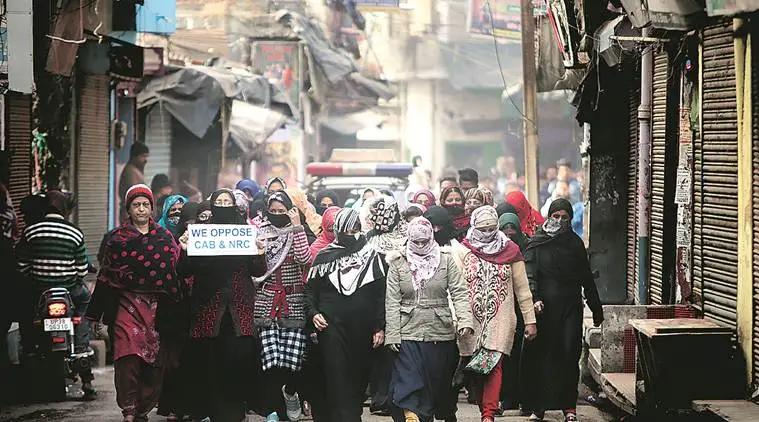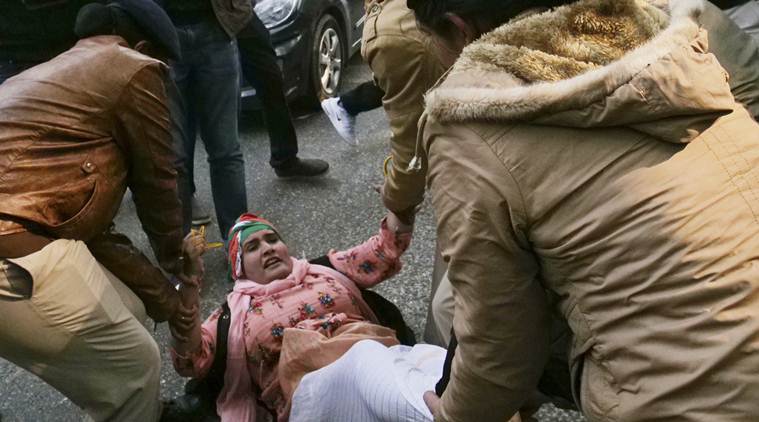Across the constituencies of Baghpat, Kairana, Muzaffarnagar, Sambhal and Rampur, many Hindus who voted for Opposition parties during the Lok Sabha elections support the government’s citizenship move.
A protest in Sambhal on December 22. (Express photo by Praveen Khanna)
Invoking the Constitution and waving the Tricolour to widen the base of the CAA-NRC protests don’t seem to be working in large parts of Uttar Pradesh. In a state deeply divided on caste lines, support for the protests is split more on the lines of religion than politics.
The state’s main Opposition parties — SP, BSP and Congress — in UP have unequivocally opposed the move. But across the constituencies of Baghpat, Kairana, Muzaffarnagar, Sambhal and Rampur, many Hindus who voted for Opposition parties during the Lok Sabha elections support the government’s citizenship move.
Their response to the police crackdown in the state — 19 deaths and over 1,100 arrests — is muted, and hardly anyone is willing to declare that the citizenship move should be rolled back.
All of them say fears over the new law are misplaced, an assert that no Muslim from their neighbourhood, village or taluka will be evicted. They also endorse communal amity and blame politics for the protests.
“What is the problem if Hindus from Pakistan and Bangladesh come here? Bangladeshi Muslims should go back to their place,” says Devendra Malik, a truck driver in his late 40s, while reading a local newspaper at the Budhana bypass in Muzaffarnagar.
Malik, who hails from the Jat community, says he voted for RLD chief Ajit Singh, who was part of a coalition with the SP and BSP during the Lok Sabha elections. He also criticises Congress leaders Sonia Gandhi and Priyanka Gandhi for supporting the protesters.
Malik’s views find an echo in a group of Jat villagers at Baghpat’s Kurri village, which is adjacent to Chhaprauli village, the home of the late Charan Singh.
“They are needlessly rioting. They are fearful that they will be kicked out. Nothing like that is going to happen. No Hindu is opposing it, only Muslims are,” says Ravinder Kumar, a Jat in Kurri waiting to unload his sugarcane stock, as other community members nod in support.
Most of them claim to have voted for RLD candidate and Ajit Singh’s son Jayant Chaudhari in the Lok Sabha elections. When it is pointed out that the RLD leadership is critical of the government’s move, Ajay Singh, a Jat, chuckles in response. “This is politics. He needs to secure his votes as well,” he says.
This group is clear that while they remain RLD voters, and are angry with the BJP government over pending cane dues, they are not on the same page with those agitating against the CAA-NRC.
While this may not come as a surprise, given the Jat-Muslim divide during the Muzaffarnagar riots in 2013, and the community’s inclination to vote for the BJP during the recent elections, other SP and BSP voters, too, are not in support of the agitation.
“I don’t think the NRC is wrong. The government move is good. Those from outside should go. There is so much unemployment here already. If these outsiders go, it will benefit us,” says Vinod Kumar, an elder from the Jatav community who trades in bamboo material at Narauli in Sambhal district, which has witnessed intense protests.
Members of other Hindu segments sitting with him endorse this view, even as a lone elderly Muslim chips in that they have “always been at peace with each other and there is no discord between Hindus and Muslims on this issue”.
Kumar says he had always voted for the BSP except for this Lok Sabha when he backed the SP candidate from the alliance.
Members of other backward communities, such as Kashyaps and Sainis, who were BSP supporters before 2014, are in agreement with the common view. Most of them claim to have voted for the BJP this year.
Police personnel attempt to detain a member of Indian Youth Congress during a protest at UP Bhawan (Express photo by Abhinav Saha)
Despite criticism from Opposition parties, the ruling establishment’s arguments against the protests and for the crackdown find resonance among Hindus in this region. Many believe the allegations that these protests are instigated by the Opposition and that those resorting to vandalism include elements that stand to lose from the new law.
“It is the political leaders who are propagating that Muslims will be expelled. That’s not the case. The government’s move is good,” says Jagatpal Kashyap at Faridpur in Bareilly district.
“The move is to expel infiltrators. Muslims born and brought up here, and whose ancestors have been here since the freedom struggle, will not be expelled. But they are being instigated for political reasons,” says Rishi Pal Singh, in his early 50s from Bilari in Sambhal district.
“This move is not against Muslims whose families have been here with us since 1947,” asserts Baburam Rajput, in his 40s, at Patwai in Rampur district.
“Protests and rioting are happening because of political reasons. It is the outsiders who are restoring to vandalism,” says Jasbir Kashyap at Baraut Road in Baghpat.








1 Comments
I am unable to read articles online very often, but I’m glad I did today. This is very well written and your points are well-expressed. Please, don’t ever stop writing. yajna
ReplyDelete